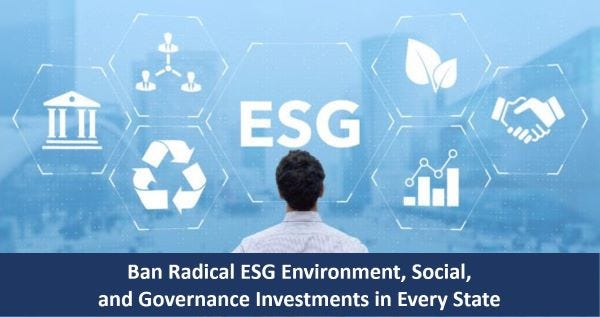It’s Time to End the War on Energy Freedom and Abolish the Partisan ESG Transfer of Wealth and Power
ESG’s primary function is to cut off capital to the oil and gas industry and direct it to ‘green’ energy.
A groundswell of resistance is emerging in the United States as elected officials, shareholders, and the public coalesce against the perceived undemocratic implications of the "Environmental, Social, and Governance" (ESG) investment framework, which critics argue has been wielded as a tool by the elite left.
This movement is characterized by multiple fronts of action. On the legislative front, federal lawmakers have put forth proposals mandating that investment advisers prioritize financial gains over non-monetary interests, seeking to ensure a focus on economic returns. Criticism has arisen, particularly from a recent study showing that ESG funds underperformed the broader market by 6.3% to 8.9% over the last five years.
Simultaneously, state treasurers are stepping up to challenge financial institutions that seem to discriminate against essential industries within their respective states.
Amidst this, consumers are pushing back against what they perceive as "Woke Corporations," expressing their displeasure with companies that adopt socially and politically charged stances.
Shareholders are taking a more direct approach by engaging CEOs, questioning the rationale behind investment firms channeling substantial American pension funds into China's economy, potentially bolstering communist leaders.
Critics contend that ESG operates as more than just an environmental initiative; they view it as an underlying wealth transfer scheme that operates under the façade of a green agenda.
The ESG framework provides a strategic means for those in power to exert control and influence over economic sectors, particularly targeting industries that hold opposing political or energy viewpoints to disproportionately disadvantage certain sectors and favor others, ultimately redistributing wealth and power within the market.
By leveraging environmental and social concerns as a cover, this approach allows the wielding of influence to advance specific political agendas while effectively marginalizing industries that do not align with the prevailing narrative.
ESG has proven elusive to a precise definition due to its subjective nature. With over 600 ESG raters and rating systems globally in 2018, its interpretation varies widely. The surge in ESG reporting and investing has led to the creation of dedicated financial products by brokerage firms and mutual fund companies, resulting in almost 700 ESG exchange-traded funds in the United States alone. Over 90% of S&P 500 companies and 70% of Russell 1000 Index companies offer ESG reports, indicating its growing importance.
August 8th-Ratings agency S&P Global stops grading borrowers’ ESG credit risk amid political backlash over ‘woke capitalism’
The Biden administration has prioritized ESG, allowing environmental and social factors to influence investment decisions for retirement funds of millions of Americans. A group of 25 states has filed a federal lawsuit against the Department of Labor's ESG rule, asserting violations of the Employee Retirement Income Security Act of 1974. This lawsuit raises concerns that the rule could jeopardize retirement plans for millions of Americans, affecting assets totaling around $12 trillion.
"Actions, not words, carve the path to a brighter future."
For the price of a $5 cup a coffee a month, you can be a part of the movement to restore America’s greatness!
Thank you in advance for your support and participation!







Alert: Please click on the campaign link. Members reported the link was broken and it's now repaired. Thank you for your support and participation!